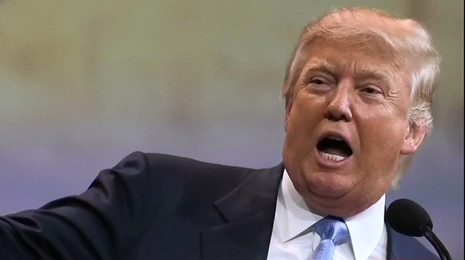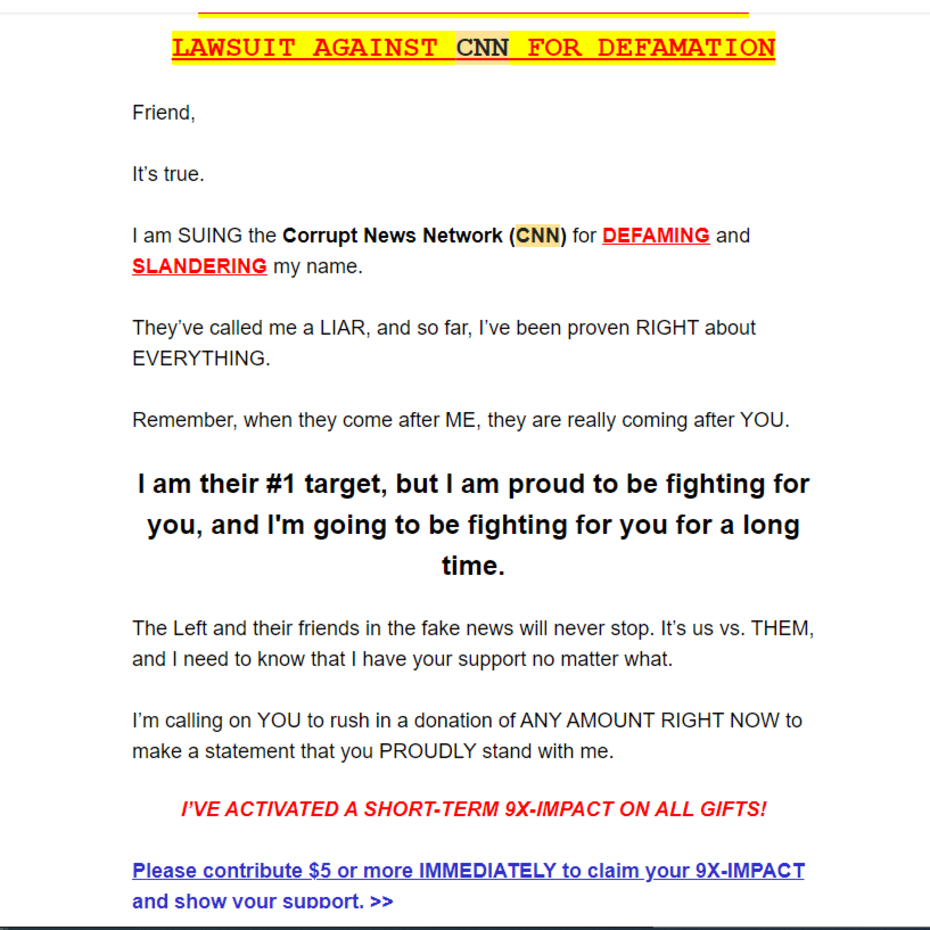 Donald Trump sued CNN on Monday for defamation, demanding $475 million in damages. How would CNN report this?
Donald Trump sued CNN on Monday for defamation, demanding $475 million in damages. How would CNN report this?
CNN's "Reliable Sources" newsletter just-restarted nine days ago, with Oliver Darcy promising a new era: "We will cover news about CNN (and parent Warner Bros. Discovery), good or bad, with the same rigor we would bring to any other outlet." Nope. This isn't "rigor."
- Donald Trump has made good on his threat to sue CNN, filing a lawsuit against the network accusing it of defamation. CNN declined to comment on Monday. (Bloomberg)
Most journalists consider this Trump suit to be a publicity or fundraising stunt, since our libel laws allow you to say all kinds of untrue and terrible things about public figures. Nicholas Sandmann forced CNN to settle because he was not a public figure when they trashed him as an insensitive racist MAGA-head. But CNN could at least alert its fans that this suit was filed. A look at their Monday night website would tell you how they much still obsess over Trump, since Biden was nowhere to be found:
CNN homepage now, pretty typical: The entire left column is Trump, Trump, Trump. No mention of Biden here anywhere.
— Tim Graham (@TimJGraham) October 5, 2022
Who's president? pic.twitter.com/5HBPN0ALJv
But let's step aside from the technicalities of our generous libel laws, and ask: has CNN defamed Trump as Hitler? Unquestionably. But Washington Post media blogger Erik Wemple can't even greet these allegations as true. Wemple began with this laughable premise:
Did Donald Trump miss the news? Under Chris Licht, CNN’s new chairman and CEO, the network is embracing middle-of-the-road newscasting and has parted ways with high-profile staffers who spoke in blunt terms about Trump’s behavior in office.
 Does Wemple never watch CNN now?
Does Wemple never watch CNN now?
Wemple claimed there was no examples of defamation in the filing, taking special exception to "Russian lackey," which is proven by "one of the most infamous moments in U.S. diplomatic history — when then-President Trump sided with Russia over U.S. intelligence regarding Russian interference in the 2016 presidential election."
Wemple even discussed the wildest hate speech on CNN, where a Reliable Sources guest claimed Trump would ultimately end up killing more people than Hitler, Stalin, and Mao combined. That's not "defamatory," because it's just an opinion.
This was a dark moment for CNN. Stelter later admitted that he should have challenged Frances (he cited technical problems, saying he hadn’t heard the statement). But the unspecific nature of the commentary and the way it’s couched — that Trump “may be” responsible for the deaths — place it in the realm of rhetorical hyperbole. Shameless commentary isn’t always libelous.
“I’m reasonably confident that a court would rule that, taken in context, that passage is an expression of opinion by Dr. Frances about the human toll of policies Trump pursued, which is protected by the First Amendment,” Lee Levine, a longtime media defense attorney, tells me by email.
Stelter offered a "My Bad" tweet, but didn't apologize on air. Wemple should just agree that CNN has engaged in defamatory rhetorical hyperbole, and it's currently protected by law. To borrow from Brian Stelter rhetoric, CNN has led a "Hate Movement" against Donald Trump, and defamation has been part of the daily diet.
CNN also strongly smeared Hitler on Trump in a Fareed Zakaria special in January:
CNN, which decries Fox News "flame throwers," smears "mainstream conservatives" with Hitler backers. Fareed Zakaria slings mud. pic.twitter.com/8yzFvO8Alk
— Tim Graham (@TimJGraham) January 12, 2022
All the cable-news channels have been able to fall back on the notion that the hottest takes on public figures are not subject to defamation claims. They can fall back on the notion that smearing a politician you despise is an "expression of opinion," and it doesn't have to match a slogan like "Facts First."
PS: This lawsuit is a fundraising tactic, as Trump's recent email demonstrates:





